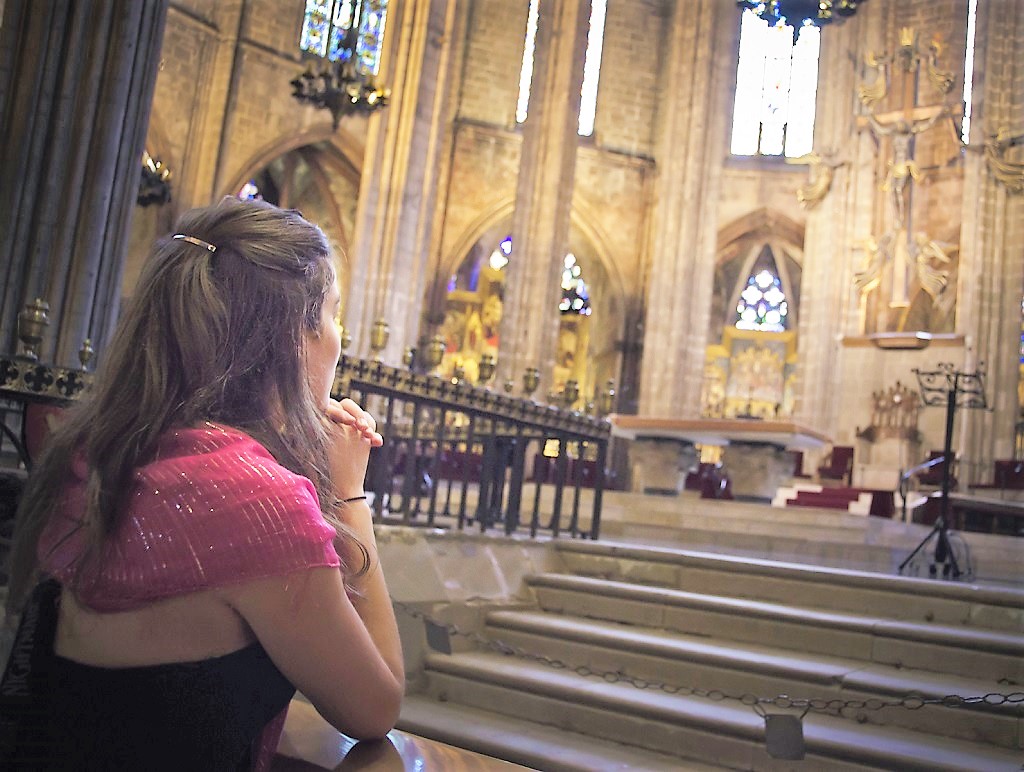For a lot of us, preparing for Mass means finding socks and shoes for everybody and trying to get to church before Father walks up the aisle. However, there is something more to preparing for Mass, and a reason to do it well.
If you have the chance, the night before Mass, look over the readings and the Gospel for Sunday. (You can always find them here.) You don’t need to memorize them, but prayerfully read over them. It is also a good practice to read the Collect. This is the opening prayer the priest proclaims right before the readings. The Collect sets the “tone” for the liturgy. Listen to God’s voice; what stands out for you in these words? This preparation will help you enter into the readings more deeply when they are proclaimed at Mass.
Remember that when you enter a Catholic Church, Christ is present. He is present in the people, but He is present in the Eucharist (reserved in the tabernacle) Body, Blood, Soul and Divinity. Christ, the Alpha and Omega, the Beginning and the End, is there, and we have the opportunity to be with Him. That alone should make us want to prepare well.
The Church requires us to fast for one hour prior to Mass (water and medications are allowed.) This small sacrifice is made so that we can focus on the Eternal Food that is Christ Himself.
When we enter a church, we bless ourselves with holy water in the name of the Father, and of the Son, and of the Holy Spirit. This is a remembrance of our baptism and our baptismal vows. It is a sign that we belong to Christ, sealed to Him at the time of our baptism. It should be done with reverence and faith.
Before we enter the pew, we genuflect. We genuflect in the direction of the tabernacle. This is our humble way of acknowledging Christ’s presence there. It is the gesture one would make before a king, and we are entering into the presence of the King of Kings. By reverently and prayerfully bending our knee and bowing our head, we are telling Christ, “I know I am in your presence, and that I am your humble servant.”
In some churches, the tabernacle is kept in a small chapel, typically used for daily Mass and Adoration. In this case, one can simply bow reverently in the direction of the altar. This symbolizes our holy veneration of the altar, where the eternal Sacrifice of Christ will be celebrated.
It is good to arrive a bit early for Mass – 10 or 15 minutes is good. This gives us time to pray. The online ministries of Creighton University says this:
Just like all formal prayer, it is really important to ask for the grace we desire during this Eucharist. We have lots of things to ask for. We know people who are sick. We may be having financial difficulties. Our marriages may be strained. We might be heart sick about struggles our adult children are having. We have many needs. Our focus at this moment is to ask for the grace we need during this next hour, at this Eucharist. We might pray, “Lord, let me enter into this celebration of your love for me. I know that if I let you love me and give me your Good News, and its challenge, and if I let you fill me with your life-giving Body and Blood, I will have deeper peace and courage, hope and a sense of mission to return to my everyday life, in your Spirit.”
When we make the effort to prepare well for Mass, it means that we can enter into the Mystery of the liturgy more fully, with a heart and mind focused on Christ. Because we are fallible beings, we won’t always be able to this (or we are wrangling toddlers who don’t understand that Daddy is trying to pray!), but God appreciates and understands our efforts. And, like exercise of the body, the exercise of our will and spirit will make them stronger and our preparations better. We pray:
May we receive the bread of angels,
the King of kings and Lord of lords,
with humble reverence, with the purity and faith,
the repentance and love, and the determined purpose
that will help to bring us to salvation.
May we receive the sacrament of the Lord’s Body and Blood, and its reality and power.
